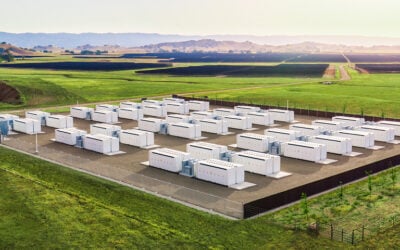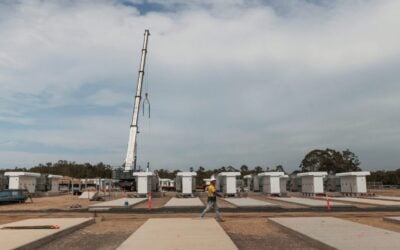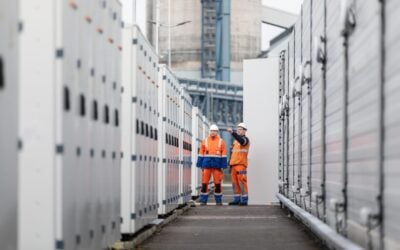
Energy company KNESS has secured a €9.6 million (US$10.35 million) loan from Oschadbank for a battery storage project in Ukraine.
KNESS, headquartered in Vinnytsia, Ukraine, announced the transaction yesterday (26 March). The company said the investment loan from state-owned public bank Oschadbank is a structured project financing deal, involving the European Bank for Reconstruction and Development (EBRD).
It will go toward the construction and grid connection of one project in the energy company’s development pipeline, which it claimed will represent one of Ukraine’s biggest battery energy storage system (BESS) portfolios when operational.
The project’s output and capacity were not disclosed in the KNESS announcement. However, the company said the BESS had been the subject of successful bids to provide 25MW of frequency containment reserve (FCR) primary frequency regulation and 5MW of automated frequency restoration reserve (aFRR) secondary frequency regulation.
Try Premium for just $1
- Full premium access for the first month at only $1
- Converts to an annual rate after 30 days unless cancelled
- Cancel anytime during the trial period
Premium Benefits
- Expert industry analysis and interviews
- Digital access to PV Tech Power journal
- Exclusive event discounts
Or get the full Premium subscription right away
Or continue reading this article for free
These contracts were awarded in special auctions for ancillary services held by the national transmission system operator (TSO) Ukrenergo. The competitive solicitations were launched in August 2024, and three rounds have been held to date.
The BESS project is scheduled to go into commercial operation in October 2025, when delivery of ancillary services to help stabilise the grid under a multi-year contract with Ukrenergo begins.
Ukraine’s electricity grid decoupled from the BRELL grid it shared with Russia and Belarus just a few days after the outbreak of the war started by Russia under the guise of a Special Military Operation.
The invaded country’s grid is now synchronised with Continental Europe’s transmission network, and KNESS said energy storage facilities will aid their synchronous operation by adding reserves. The three Baltic states—Lativa, Lithuania and Estonia—recently followed in decoupling from the BRELL grid earlier this year.
KNESS, which has deployed a 1.2GW portfolio of renewable energy assets in Ukraine to date through its KNESS Energy subsidiary, said it is deploying a portfolio of seven BESS projects in Ukraine’s three regions. Its total special auction wins add up to 79MW of FCR along with the 5MW of aFRR contracts.
Energy storage deemed vital for economy and energy security amid war with Russia
Vadym Utkin, energy storage lead for DTEK, a leading Ukrainian independent power producer (IPP), spoke with Energy-Storage.news about the ancillary services auctions following his company’s wins in the first round.
Utkin noted that contracts are indexed to the Euro, mitigating currency fluctuation risk, and said the FCR auctions had been oversubscribed, while aFRR, due to its less well understood impact on battery degradation, had been undersubscribed.
Nonetheless, the DTEK energy storage lead said the FCR market will likely saturate much more quickly than aFRR, which he saw as “the future” for BESS across Europe in terms of ancillary services.
DTEK had said shortly before that interview that it would invest around €140 million in a 200MW/400MWh portfolio of auction-winning projects, and in January Fluence was announced as the portfolio’s technology provider and system integrator.
With the war continuing to rage and Russia targeting Ukraine’s infrastructure, including power generation facilities, energy is a strategically important sector.
Oschadbank, a commercial bank in which 100% of shares are held by the Ukrainian government, is prioritising industries critical to the national economy and boosting its export potential.
In February, it became the third bank in Ukraine to join an EBRD programme for supporting energy security projects. The Energy Security Support Facility (ESSF) enables EBRD to share project risks of up to €100 million for Oschadbank sub-loans from a total pot of €700 million.
At least 70% of those sub-loans will be made to green energy transition (GET) projects, and all borrowers under the ESSF will receive technical assistance to structure and implement investments.
The EBRD noted in its February announcement of the agreement that Russian attacks have caused the loss of more than 9GW of generation capacity in Ukraine.





